Sunday, March 14
Paula: We left Cambodia late this morning and will have a half day in Bangkok before heading to Beijing. We said goodbye to Thy, who promised to keep in touch. It's hard to articulate what it has meant to get to know this man, who like so many people here has lived though horrors we cannot even begin to imagine.
Thy appears to be well positioned to prosper here as long as the country continues to remain stable. He has educated himself, learned to speak English and in addition to working in Cambodia's growing tourism industry, he has also invested in land and diversified by starting a small business farming crocodiles. Despite all this, he softly admits that his people continue to worry about the country. They continue to fear more corruption in the government and even more civil war. The election which was months ago has still not resulted in the selection of a prime minister. The king is 82 years old and there is no apparent heir. Thy told us that the people here prefer to keep their money in U.S. dollars and that many purchase gold which they hide under their pillows rather than place it in a bank. In a country where only 30 years ago all money and personal possessions became worthless over night, this is perfectly understandable.
Cambodia tugged at our hearts throughout our stay here. We heard and saw
with our own eyes some of the devastation caused by years of ongoing war.
The temples were magnificent but the harsh reality is that even these religious
temples became bunkers during the war and were surrounded by landmines that
disabled thousands of people.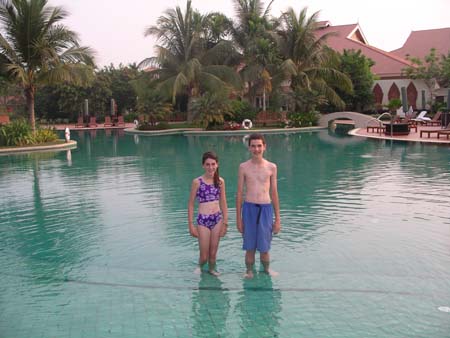
We stayed in a beautiful hotel here. The friendliness and kindness of the Cambodians working here was genuine. But seeing and experiencing the world they call home made it more difficult than ever to enter the confines of the hotel each day. We longed for the comforts of the hotel's air conditioning, clean linens and refreshing pool, but also felt guilty taking advantage of such luxuries.
We carried small bills wherever we went so that we could easily give to the many hands that sought a little compassion. Many of the people in the villages didn't beg but we felt better giving them a little in return for speaking with us and letting us take their pictures -no one seemed ashamed to accept our offer, nor should they. We wanted to give larger amounts to some of the villages, schools and hospital we visited but were also aware that a larger amount given to the officials often doesn't make it into the hands of the individuals needing help. We continue to struggle with how we can make small but tangible differences.
On a lighter note, we have also learned a lot about cultural differences and the importance of respecting these customs. We saw this demonstrated quite dramatically yesterday at the restaurant where we had lunch. A large group of French tourists were eating next to us when the waitresses brought in a birthday cake with candles. The group sang happy birthday and a delighted gentleman quickly blew out the candles. He then rose from his chair and attempted to hug the waitresses who had brought out the cake. Of course this was a gesture of thanks but the waitresses all ran away from him, clearly uncomfortable with the situation. Thy had told us earlier in the week that a man and woman are not allowed to touch in public. This helped us understand the situation and why the women were so embarrassed. We have tried to develop a basic knowledge of the culture in each of the places we visit. We have learned a few words in each language but somehow this just doesn't seem to be enough. To really understand another culture requires investing much more time and effort than we are able to give. We hope that we have at least gained a deeper appreciation for the importance of cultural differences.
After arriving in the Bangkok Airport for the fifth time in the past month, we were thankful to have a few hours of "downtime" in our hotel to catch up on some reading and writing. We can't believe we have finished our time in Southeast Asia and are ready to head to China.
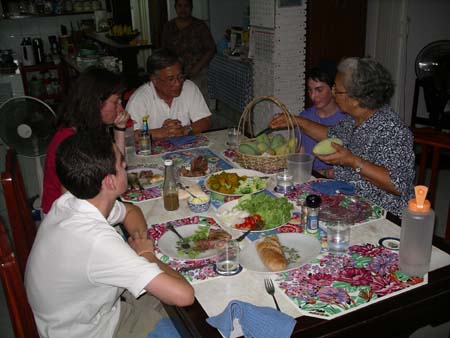 In
the evening we enjoyed the wonderful hospitality of Poolsook and Viriya Sriyaporn.
Poolsook and Viriya are long time friends of Dr. Ruby Wilson. Dr Wilson was
the Dean of Duke University's School of Nursing when I attended and she insisted
we look up Poolsook while we were here.
In
the evening we enjoyed the wonderful hospitality of Poolsook and Viriya Sriyaporn.
Poolsook and Viriya are long time friends of Dr. Ruby Wilson. Dr Wilson was
the Dean of Duke University's School of Nursing when I attended and she insisted
we look up Poolsook while we were here.
Poolsook and Viriya invited us to their home in Bangkok and treated us to
a delicious meal. We especially enjoyed the dessert of mangos with sticky
rice. The mangoes were fresh from their garden and like none we had ever eaten
before! They had very small thin seeds in the middle and were soft, juicy
and very sweet - not at all like the type 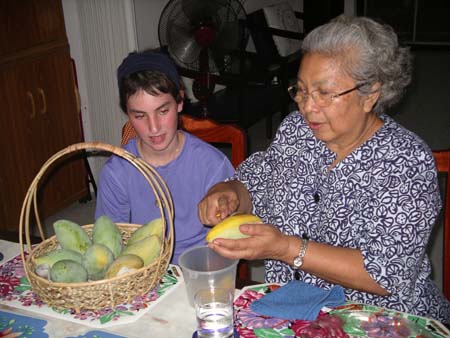 we
have eaten in Boston. We all laughed when their son Lule who joined us for
dessert, explained that a mango is not a mango. In fact, there are 10 different
varieties of mango in Thailand similar to how there are many varieties of
apples in the United States. To Americans there is only one variety of mango
and to people from Thailand there is only one kind of apple. Of course, this
all made perfect sense once we stopped and thought about it.
we
have eaten in Boston. We all laughed when their son Lule who joined us for
dessert, explained that a mango is not a mango. In fact, there are 10 different
varieties of mango in Thailand similar to how there are many varieties of
apples in the United States. To Americans there is only one variety of mango
and to people from Thailand there is only one kind of apple. Of course, this
all made perfect sense once we stopped and thought about it.
The evening was spent sharing stories of our lives and travels. As we showed
them our web page on their computer, we noticed that they used an English
keyboard. Poolsook and her son both told us it was 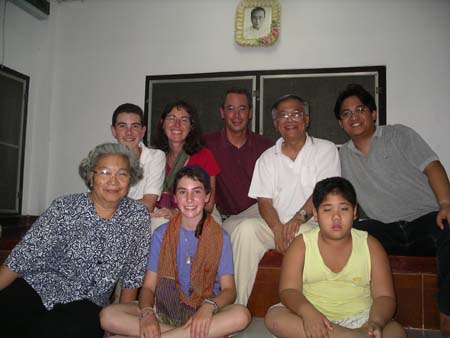 much
easier to type in English than use the 44 characters necessary for Thai.
much
easier to type in English than use the 44 characters necessary for Thai.
As we headed back to the hotel, we all promised to keep in touch. Meeting this lovely family made our final day in Thailand memorable. Now it's off to China!
David's Daily Dump - Scars left by the Khmer Rouge. The scars left
by the Khmer Rouge are all too visible in Cambodia today. From 1975-1979,
this horrifying organization ruled Cambodia, and slaughtered millions of their
own people. Pol Pot's regime devastated the country and threw it into a state
of shock and terror. It wasn't until I saw men with only one leg and memorials
filled with the skulls of innocent people that I fully understood how terrible
the Khmer Rouge really was. 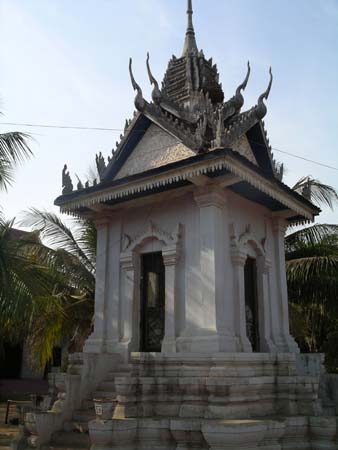
Some of the most discouraging sights you see on the streets of Siem Reap are the crippled beggars who stepped on landmines. One of the conversations we had with a crippled man selling small Buddha's and figurines near a temple was particularly sad. We asked him how he lost his leg and he responded despondently saying he stepped on a landmine while fishing in the rice paddies. He said that he was desperate for food and took the risk of going out into the paddies where land mines had been planted. We saw many other crippled men on the streets begging and playing music. We passed out all the riels (Cambodian currency) we had, but still could not get over our deep sorrow and grief for them. Many organizations around the world are working together to clear the landmines, but there are still over two million of them left, scattered throughout the country.
Learning about Pol Pot on Encarta is one thing, but to hear stories from
Cambodians who lost their parents and siblings from his regime is another.
The most  interesting
and depressing story we heard was from our guide, Thy.
interesting
and depressing story we heard was from our guide, Thy.
Thy's family lived in Siem Reap when the Khmer Rouge started attacking Cambodia.
At only two years old he remembered very little but learned all about his
life from his parents who survived the regime. His family took refuge in Angkor
Wat when Pol Pot's armies finally reached their home town. His mother remembered
the exact spot where they slept and he showed us the tiny corner where they
lived during the invasion! 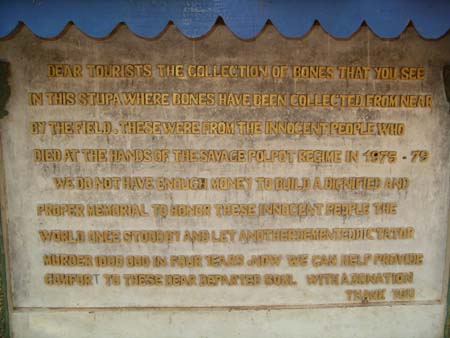
When the Khmer Rouge took over Siem Reap, Tea's family was split up and his mother took care of him throughout the four years. He told us that his stomach bulged out because of lack of food, and that his head got very big. He also said that he was constantly asking for more food and his mother even risked her life to trade a blouse for more rice. In her desperate attempt to save her son she was caught and brought to a prison with Thy. There they were tied up to trees while soldiers covered them with ants and beetles. They got terrible bites and Thy got extremely sick. He was forced to live in the hospital for two months and then was surprisingly sent back to the village with his mother. The Vietnamese liberated the village soon after and Thy's sister and father reunited with them in Siem Reap. The whole family worked very hard to build a home, find food, and make a living.
Siem Reap took a while to recuperate from the war. A school was not built in their village until Thy was 12 years old, so he had to wait a long time to attend school!! The family now lives together on the outskirts of Siem Reap producing ice and raising crocodiles.
Unfortunately our driver was not so lucky. We learned that his parents died
during Pol Pot's regime and that he was left an orphan. He was then brought
up by his godfather after the liberation.
Although the Khmer Rouge is long gone, all Cambodians are worried about a
repeat in history. The government is unstable and has no control over what
happens in the country. We learned that no one saves money in the bank because
if another group took over the government their money would be worthless.
Instead most people buy gold and hide it in their homes. Some just use US
Dollars!
Pol Pot's Regime had a devastating and deadly effect on all of Cambodia. Millions of people were tortured and killed for no apparent reason. There are hardly any old people left in Cambodia, and 60% of all women are widows! For survivors, it's a loss of five years of their lives and something not to look back upon. Everyone wants the Khmer Rouge officials to be tried in court, although it has yet to happen. Only a couple of them are in prison, the others are well known and are still living in Cambodia.
I think that it is very important for everyone around the world to understand and remember what happened to the millions of innocent victims of the Khmer Rouge. It's something we can never afford to forget.
